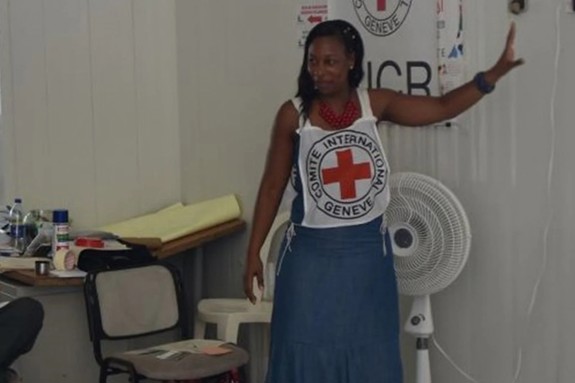“If something can be done, then we must push through and overcome the barriers”
Lorena Mosquera is a nurse in Chocó, Colombia. She works in medical facilities in remote areas beset by armed conflict, raising awareness of the importance of safeguarding health-care services and respecting international humanitarian law in general.

Lorena Mosquera grew up in Bogotá but she has ties with Chocó through her parents, who were born in that area. At a young age she realized that many people there were in need, and she knew she wanted to help them.
“We have a lot of diversity in our region – different ethnic groups, different terrain, different weather – so it can be tricky to reach some of the places where our support is needed. Belonging to the ICRC really makes a difference in gaining access to these remote areas. We simply arrive with the ICRC logo and a smile, and the people of Chocó welcome us as a symbol of hope.”
”It’s important to know their language to gain the trust of their ancestral leaders”
To communicate better with some of these communities, to pass on messages and explain her work, Lorena learned some words in the languages of the indigenous Emberá and Wounaan people. Without this knowledge it would be very difficult for the ICRC to fully understand the situation of patients living in this part of the country. "It’s important to know their language to understand what the people are going through, what their needs are, and above all, to gain the trust of their ancestral leaders."
“What has really struck me is that I can make a big difference to people’s lives. In this region we’ve been able to support the families of people who have disappeared, became victims of sexual violence, parents of and minors themselves who were kidnapped during the conflict and people who’ve been directly harmed by the war. Many have had to reinvent themselves, to adapt and find new ways of doing things, particularly if they’ve become disabled or if they suffer from mental health issues. We help them feel included in society again, and encourage them to receive treatment. I truly believe that the ICRC is a voice of encouragement to victims who are trying to cope with these very complex situations.”
”I have developed an inner strength that enables me to combine feelings and clear thinking”
“Professionally, cases of sexual abuse of very young children are the hardest part of the job for me, especially as I have a little girl of my own. I think that being a woman makes me extra sensitive, and it makes a difference when connecting with victims and other people affected by sexual violence. But I’ve developed an inner strength that enables me to combine feelings and clear thinking, without losing the sensitivity you need when treating victims of violent conflict. It’s important not to let these bad experiences come to seem natural or normal.”
“One of the things that’s made me proud of my work has been witnessing how victims of sexual violence have been able to make different life choices thanks to our medical and psychological support. Some of them had been contemplating suicide or lowered their expectations of life because of their traumatic experiences. It’s inspiring to see that, after receiving support, they found ways to lead productive lives and even go on to support other women in similar situations.
“My best advice to other women in the field would be to put your whole heart into what you do and to never limit yourself. I always think that if something can be done, then we must push through and overcome the barriers. When you work together as a team, towards a common goal, you can achieve success and truly bring power and dignity to people.”
Lorena Mosquera
ICRC
